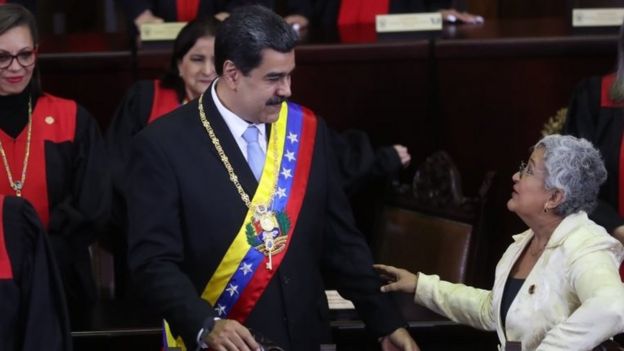
The electoral council in Venezuela says a fire in its main warehouse near the capital, Caracas, has destroyed most of the voting machines held there.
Almost 50,000 voting machines and 582 computers used in the country's elections went up in flames, electoral council chief Tibisay Lucena said.
She did not say if parliamentary elections due later this year could be affected by the loss of the machines.
She also asked prosecutors to investigate the cause of the fire.
The fire broke out in the 6,000 sq m (65,000 sq ft) warehouse in Mariche, east of Caracas, on Saturday.
"Burnt in this fire were 582 computers belonging to the civil registry, 49,408 voting machines, 400 electronic ballots," Ms Lucena said in a news conference on Sunday.
While the warehouse is the main storage facility of the National Electoral Council (CNE), Ms Lucena said, "The electoral process is far from being destroyed."
She told reporters electoral procedure in Venezuela consisted of three steps and "only two of its processes" had been affected.
However, she did say that "little" had been salvaged from the fire despite great efforts made.
"Nothing is being ruled out," Ms Lucena said, telling reporters that ahead of elections for Venezuela's National Constituent Assembly, the CNE and its infrastructure had been targeted.
"In 2017, those who did not want elections were vicious against the voting machines. They attacked operators, they burned vehicles, they made death threats, they burned voting machines, but the election took place.
"If there are groups who think that they can stop the electoral processes they're mistaken, they haven't accounted for the determination of the men and women of the electoral branch".
Recent elections in Venezuela have been beset by allegations of fraud. The company that provided the voting system in the 2017 election for the constituent assembly said that turnout figures had been inflated by one million, an allegation the CNE denied.

Critics of the CNE say it is made up of stooges of the government
There were also allegations of vote-rigging in the 2018 presidential election in which incumbent President Nicolás Maduro won another six years in power.
The CNE has also been the target of much criticism.
Under the Venezuelan constitution, the CNE is the official independent body responsible for overseeing and guaranteeing the transparency of all elections.
But critics of the government of President Maduro say that four of the CNE's five members are government stooges.
Elections for the National Assembly are due to be held before the end of the year. No date has been set yet.
The National Assembly is the only Venezuelan institution which is not currently controlled by the Maduro government.
Its leader, Juan Guaidó, is the main opposition figure and has been recognised by more than 50 countries as Venezuela's legitimate president.
Many in the opposition fear that if elections are held later this year without the CNE and the electoral processes being reformed first, the poll could be rigged and the government could seize control of the National Assembly.